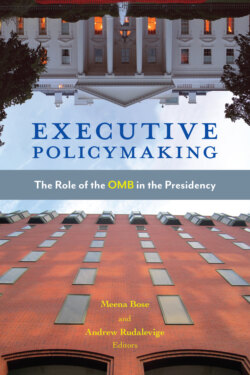Читать книгу Executive Policymaking - Andrew Rudalevige - Страница 6
На сайте Литреса книга снята с продажи.
ОглавлениеAcknowledgments
The origin of this project, centered on the myriad responsibilities of the Office of Management and Budget (OMB) in executive policymaking, was Hofstra University’s Conference on the George W. Bush Presidency in March 2015. That conference and the three edited volumes preserving its scholarshipa inspired participants to wonder whether Hofstra might expand its focus on the presidency to include executive branch institutions. After all, as OMB nears its centenary (the agency was created as the Bureau of the Budget in 1921), we are overdue for an assessment of its evolving role in budget policy, executive branch management, and central clearance for legislative proposals, regulations, and executive orders. How OMB’s long history of “neutral competence” survives and thrives in our presently polarized political landscape is of key concern to all who care about the efficient and effective management of our sprawling federal establishment. Which is to say, all of us. A symposium at Hofstra followed in April 2019, bringing together scholars and practitioners for conversations regarding all of these functions and OMB’s broader role in the federal establishment. The relevance of those conversations has only grown since—indeed, today’s headlines place budget minutiae, in the form of the apportionment footnotes that governed release of the military aid appropriated for Ukraine in fiscal year 2019, at center stage of only the third presidential impeachment trial in American history.
Our first acknowledgement, then, must be to Hofstra University and its appreciation of the importance of scholarship on the American presidency and policymaking, and specifically, with deepest gratitude, to Hofstra trustee Peter S. Kalikow (class of 1965) for establishing the university’s Peter S. Kalikow Chair in Presidential Studies in 2006, the Peter S. Kalikow Center for the Study of the American Presidency in 2007, and the Peter S. Kalikow School of Government, Public Policy and International Affairs in 2015. Mr. Kalikow inspires students and faculty alike with his dedication to advancing scholarly and public understanding of politics, policy, and public service. His continuing encouragement, counsel, and assistance in organizing events are instrumental in developing that understanding.
Many other offices and individuals at Hofstra were also indispensable to making the OMB symposium and this edited volume possible, including (but hardly limited to) the Board of Trustees; Hofstra Cultural Center; Office of University Relations; Hofstra University Museum; Hofstra University Library Special Collections; President Stuart Rabinowitz; Provost Herman A. Berliner; Dean of the Hofstra College of Liberal Arts and Sciences Benjamin Rifkin; the Kalikow Center Faculty Advisory Council; and the Political Science Department. We also thank Elizabeth McCormack, Dean of Academic Affairs at Bowdoin College as well as the college’s Faculty Development Committee and Department of Government and Legal Studies, for additional support.
Bridging the worlds of academe and policymaking is no easy task, and the symposium participants—chapter authors and discussants both—illustrate in the pages that follow how constructive conversations that connect the two can be. We are very grateful to the scholars who took the time to expand our knowledge of OMB with new research at Hofstra’s 2019 symposium and then revised their analyses for this volume. Thanks as well to the Partnership for Public Service, which adapted and updated portions of their excellent 2016 report From Decisions to Results to serve as the conclusion to this volume.
Special thanks go to Jacob “Jack” Lew, the only person to serve as OMB director in two separate administrations. Director Lew not only wrote the foreword to this volume but gave the symposium’s keynote address and has allowed us to reproduce it here. His remarks stress the extraordinary career staff that serve OMB—and have done since its inception. Symposium participants bore direct witness to the expertise and professionalism of a small sample of that staff: deep thanks to Kathleen Peroff, Kathy Stack, and Boris Bershteyn for participating as symposium discussants and providing indispensable commentary and guidance on the research presented here.
We also want to thank a group of Budget Bureau and OMB alumni/ae and current staff who took part in a collective interview and whose hundreds of years of collective agency experience were hugely helpful to the authors. These include Barry Clendenin, Phil Dame, Susan Jacobs, Bernie Martin, Larry Matlack, Kathy Peroff, Alan Rhinesmith, Ken Ryder, Kathy Stack, and Mary Cassell. We additionally thank Jeffrey Weinberg from OMB for sharing his expertise and commentary in a roundtable with some of the symposium contributors at the 2019 Annual Meeting of the American Political Science Association and for his strong support of research into OMB over the years.
Finally, we thank Brookings Institution Press, notably Bill Finan for his keen interest in and support of this project from the outset, and Elliott Beard for designing such an engaging and thought-provoking cover. Special thanks also to Kathi Anderson, Fred Dews, Cecilia González, Steven Roman, and Robert Wicks for their painstaking work in producing and publicizing this book.
The absolute dedication of everyone who contributed directly or indirectly to this volume with informed, respectful analysis made this process not just informative but enjoyable: it served as a model for scholarly discourse. That fruitful intellectual collaboration underlies and informs the entire volume.
a Meena Bose, ed., The George W. Bush Presidency, Volume I: The Constitution, Politics, and Policymaking (Hauppauge, NY: Nova Science Publishers, 2016); Meena Bose and Richard Himelfarb, eds., The George W. Bush Presidency, Volume II: Domestic Policy (Hauppauge, NY: Nova Science Publishers, 2016); Meena Bose and Paul Fritz, eds., The George W. Bush Presidency, Volume III: Foreign Policy (Hauppauge, NY: Nova Science Publishers, 2016).
